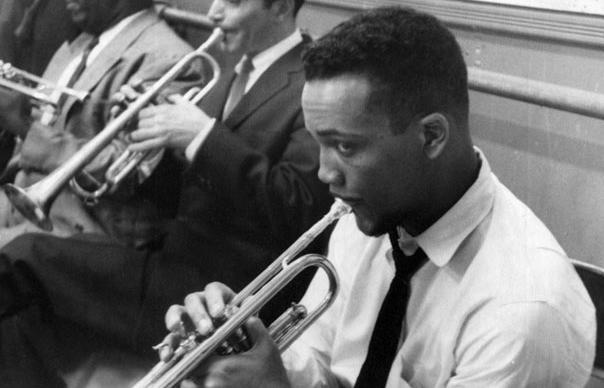Bargain priced boxsets showcasing the early genius of Mr Jones... Before he started writing for Hollywood, and long before his protégé Michael Jackson was even born, Quincy Jones enjoyed a colourful career. He spent his 1950s playing trumpet with Ray Charles and Lionel Hampton, writing arrangements for the likes of Sarah Vaughan, Count Basie and Dizzy Gillespie, and charming his way into senior management positions at major labels. But even the most diligent jazz collectors will be surprised at quite how many albums he released under his own name in between the mid 50s and mid 60s – LPs undocumented by most jazz encyclopaedias, most remaining out of print long after Thriller had made Quincy the most successful producer on the planet. It makes these two box-sets particularly welcome releases, especially given that both comprise out-of-UK-copyright recordings and retail for the criminally cheap sum of £7. Complete Recordings 1955-59 (8/10) crams the first seven first albums he recorded for ABC-Paramount and Mercury onto four CDs. Best of the bunch is 1956’s This Is How I Feel About Jazz, a mix of bop swagger and West Coast cool-school featuring stellar names (Charles Mingus and Hank Jones are all on board). There are a couple of bombastic big-band LPs with Art Farmer and Harry Arnold but, by 1959, the hard bop was being adulterated with daft novelty arrangements and pedestrian reworkings of standards. By the 1960s, the movie world proved to be Quincy’s salvation, both financially and creatively. Complete Recordings 1960-62 (/10) contains his first soundtrack –Pojken I Tradet (The Boy In The Tree) is an obscure 1961 Swedish movie about a rebellious rural teenager, and Quincy’s dramatic orchestral score seems to alter the way he worked, even with ostensibly mainstream jazz sessions. Although albums like 1961’s The Quintessence feature some breezy section work from top players (Freddie Hubbard, Clark Terry, Phil Woods), the improvisation has been replaced by tighter and more elaborately arranged charts. Quincy had an ear for hip trends – confronted with 1962’s bossa nova craze, he removed the pianos, the acoustic guitars and any pretence at subtlety and invented Big Band Bossa Nova, the results either comical (as with Austin Powers’ fave, “Soul Bossa Nova”) or thrilling (the rambunctious version of Mingus’s “Boogie Stop Shuffle”). A package of albums like this contains too much overlap. But one can’t really complain too much – this is one of the twentieth century’s finest canons of work. John Lewis
Bargain priced boxsets showcasing the early genius of Mr Jones…
Before he started writing for Hollywood, and long before his protégé Michael Jackson was even born, Quincy Jones enjoyed a colourful career. He spent his 1950s playing trumpet with Ray Charles and Lionel Hampton, writing arrangements for the likes of Sarah Vaughan, Count Basie and Dizzy Gillespie, and charming his way into senior management positions at major labels. But even the most diligent jazz collectors will be surprised at quite how many albums he released under his own name in between the mid 50s and mid 60s – LPs undocumented by most jazz encyclopaedias, most remaining out of print long after Thriller had made Quincy the most successful producer on the planet.
It makes these two box-sets particularly welcome releases, especially given that both comprise out-of-UK-copyright recordings and retail for the criminally cheap sum of £7. Complete Recordings 1955-59 (8/10) crams the first seven first albums he recorded for ABC-Paramount and Mercury onto four CDs. Best of the bunch is 1956’s This Is How I Feel About Jazz, a mix of bop swagger and West Coast cool-school featuring stellar names (Charles Mingus and Hank Jones are all on board). There are a couple of bombastic big-band LPs with Art Farmer and Harry Arnold but, by 1959, the hard bop was being adulterated with daft novelty arrangements and pedestrian reworkings of standards.
By the 1960s, the movie world proved to be Quincy’s salvation, both financially and creatively. Complete Recordings 1960-62 (/10) contains his first soundtrack –Pojken I Tradet (The Boy In The Tree) is an obscure 1961 Swedish movie about a rebellious rural teenager, and Quincy’s dramatic orchestral score seems to alter the way he worked, even with ostensibly mainstream jazz sessions. Although albums like 1961’s The Quintessence feature some breezy section work from top players (Freddie Hubbard, Clark Terry, Phil Woods), the improvisation has been replaced by tighter and more elaborately arranged charts. Quincy had an ear for hip trends – confronted with 1962’s bossa nova craze, he removed the pianos, the acoustic guitars and any pretence at subtlety and invented Big Band Bossa Nova, the results either comical (as with Austin Powers’ fave, “Soul Bossa Nova”) or thrilling (the rambunctious version of Mingus’s “Boogie Stop Shuffle”).
A package of albums like this contains too much overlap. But one can’t really complain too much – this is one of the twentieth century’s finest canons of work.
John Lewis



